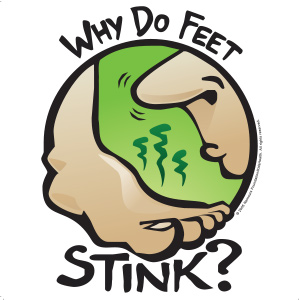Why Do Feet Stink? (for Kids) (original) (raw)
They're your tootsies, your dogs, your piggies. Whatever you call them, feet are an important part of you. Without them, you couldn't stand up, walk around, or run a race. In fact, your feet work so hard for you that sometimes they get sweaty. And stinky.

Think of a hot, summer day when you've been walking around an amusement park all afternoon. Oooh, boy — your feet have been in those sneakers a long time! On the car ride home, you decide to kick off your shoes. It feels good, but it smells bad. In fact, you might get an earful from the other passengers in the car: P.U. — what stinks?
Bacteria are to blame. These tiny critters normally inhabit your feet and love dark, damp places like the insides of sweaty shoes. They multiply in sweat, so if you don't wear socks, that really gets them going.
In the right conditions, bacteria will feast on your feet. These bacteria eat dead skin cells and oils from your skin. Their colonies will grow and start getting rid of waste in the form of organic acids. It's those organic acids that smell bad.
And for 10% to 15% of people, the smell is really bad. Why? Because their feet are extra sweaty and become home to bacteria called Kyetococcus sedentarius (say: kite-oh-KAH-kus SEH-den-tair-ee-us). These bacteria produce more than just stinky organic acids — they also produce stuff called volatile sulfur compounds. Sulfur compounds usually are powerful and awful smelling. If you've ever smelled a rotten egg, you know what volatile sulfur compounds smell like.
Page 1
What Can You Do?
There’s usually no need to worry about stinky feet. But if the stink bothers you or someone notices it, you may want help to step in.
So how can you stop your feet from stinking? Well, you might not be able to stop stink completely. But if you cut down on sweat, you'll cut down on the odor.
Try these steps:
- Be clean. Wash your feet every day. Dipping your feet into a tub of water and scrubbing may be better than just letting the shower water splash on them. Be sure to dry your feet when you're done.
- Wear the right socks. Cotton, some wools, and special knits made for athletes will absorb sweat and allow your feet to breathe. Put on a fresh pair every day, and also if the socks get damp.
- Make sure your shoes aren't too tight. If they are, your feet might sweat more than normal.
- Switch shoes. Wearing the same shoes every day can make them smellier. Let them dry out for a couple of days before wearing them again.
- Kill those germs. Ask your mom or dad about using a disinfectant spray to kill bacteria in your shoes. You also might wash your feet with antibacterial soap. Setting shoes out in the sun also may help.
- Wash shoes or insoles. Some insoles or shoes, especially sneakers, may be washable — a great way to kill odors and get clean-smelling shoes again. Be sure to dry them completely before wearing them.
- Avoid shoes made of plastic. Plastic and some human-made materials don't let your feet breathe.
- Go barefoot. Let your feet air out by letting them spend some time in the open air, especially at night. But don't go barefoot too much — especially in the outdoors — because that can invite certain bacteria (like that Kyetococcus) to live on your feet!
- Don't share shoes or towels with others. If you do, that may transfer stink-causing bacteria from other people's feet to yours. Gross!
If you still have problems with foot odor, talk with your mom or dad to get their opinion. If they agree think the stink is a concern, they can try getting you odor-fighting powder or insoles. If nothing seems to work, you might want to talk with your doctor about what to do. The doctor may give you a special medicine to put on your feet.
For most people, foot odor can be controlled. The worst part about having stinky feet is that it's embarrassing. If you're worried about this, just keep your shoes on when you're in social situations, like when you're at school or riding in a car.
At home, keep your feet clean and go barefoot so they get some air. If your feet are clean and dry, those bacteria will have to find their lunch somewhere else!